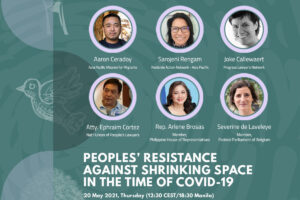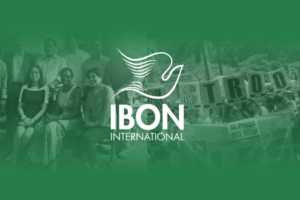[[{“type”:”media”,”view_mode”:”media_original”,”fid”:”2030″,”attributes”:{“alt”:””,”class”:”media-image”,”height”:”320″,”style”:”width: 620px; height: 205px;”,”typeof”:”foaf:Image”,”width”:”969″}}]]
Originally posted in the CSO Partnership for Development Effectiveness website. Get the report below.
Manila, 9 March 2018 – Development cooperation actors must ensure human rights-based approaches (HRBA) particularly in working to attain the Sustainable Development Goals (SDGs), or else programmes and projects risk grave consequences including loss of shelter, hindrances to livelihood opportunities, and health hazards – this is according to the latest report published by the CSO Partnership for Development Effectiveness (CPDE) and edited by the IBON Institute for International Development.
The report is a collection of critical papers written by 14 CPDE member organizations. In their contributions, members analysed how human rights are upheld or otherwise disregarded in policies and practices, as seen in various projects and multi-stakeholder partnerships (MSPs).
Due to the increased levels of resources needed to foot the SDGs, the 2030 Agenda calls for a “revitalised Global Partnership for Sustainable Development”. Specifically, SDG 17 calls for governments and stakeholders to revitalise this Global Partnership through development co-operation, mobilising finance, technology, capacity building, open trade and policy coherence. MSPs will be critical in rallying these resources until 2030.
The CPDE research, however, revealed that lack of meaningful civil society participation in MSPs and the dearth of effective redress mechanisms to ensure duty bearers' accountability to rights-holders are both gaps in existing development partnerships.
Only 8 donor-countries accounted for 78% aid allocated to human rights purposes and 71% allocated to participation and civil society, indicating poor support of donors for HRBA.
Although advocated for in United Nations statements and particularly in the Agenda 2030, only a few countries – regardless of whether they are donors or recipients of aid – are known to implement HRBAs in their development policies.
Today, over half of the world’s population live in countries that have not ratified conventions ensuring human rights such as the freedom of association or the right to organise.
The CPDE report also shows why the traditional approach to development partnerships is failing to bridge the gap in development between rich and poor, and how adopting an HRBA is the way forward to achieving effective development co-operation. The in-depth report features studies from Latin America, Africa, South-East Asia and even global bodies on development cooperation, that look into the absence or presence of HRBA on a number of development areas and its effects on project outcomes — especially on communities.
[[{“type”:”media”,”view_mode”:”media_original”,”fid”:”2027″,”attributes”:{“alt”:””,”class”:”media-image”,”height”:”595″,”style”:”width: 620px; height: 470px;”,”typeof”:”foaf:Image”,”width”:”785″}}]]From the Frequently-Asked Questions on HRBA by CPDE. Infographics are also available here.
HRBA represents a paradigm shift crucial in achieving the SDGs as it affirms the agency of the poor and marginalised peoples to chart their own destiny by empowering them as rights-holders, not beneficiaries of charity, says the report.
In summary, the report presents the following policy recommendations to reinforce rights-based partnerships for sustainable development:
1. Analyse human rights in the context of power relations;
2. Empower rights-holders, especially women and the most marginalised, by fully respecting their right to organise;
3. Institutionalise participation of rights-holders at all levels of governance;
4. Allow local actors to take the lead in defining priorities and strategies for the development agenda;
5. Build the capacity of duty-bearers to fulfill human rights;
6. Enhance transparency of development partnerships;
7. Conduct rights-based audits; and
8. Improve the accountability of duty-bearers by strengthening a range of mechanisms. ###




